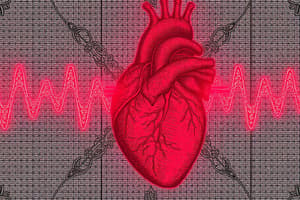Podcast
Questions and Answers
What is the normal origin of a Supraventricular rhythm?
What is the normal origin of a Supraventricular rhythm?
- AV node
- Bundle of His
- SA node (correct)
- Ventricricle
Which part of the heart experiences depolarization during a P wave?
Which part of the heart experiences depolarization during a P wave?
- Purkinje fibers
- AV node
- Ventricle
- Atria (correct)
Which type of rhythm comes from above the AV node?
Which type of rhythm comes from above the AV node?
- Escape
- Ventricular
- Supraventricular (correct)
- Junctional
What characterizes a Ventricular rhythm?
What characterizes a Ventricular rhythm?
When does an Escape rhythm typically occur?
When does an Escape rhythm typically occur?
What is a common characteristic of a Junctional escape rhythm in dogs?
What is a common characteristic of a Junctional escape rhythm in dogs?
What term is used to describe the paired beats that look different from each other but occur repeatedly at regular intervals?
What term is used to describe the paired beats that look different from each other but occur repeatedly at regular intervals?
Which type of beats are happening between the circled beats in the text?
Which type of beats are happening between the circled beats in the text?
In what rhythm are multifocal VPC's seen?
In what rhythm are multifocal VPC's seen?
Which symptom is NOT mentioned in the text as a consequence of the described rhythm?
Which symptom is NOT mentioned in the text as a consequence of the described rhythm?
What is the ultimate recommendation for patients experiencing the described rhythm in the text?
What is the ultimate recommendation for patients experiencing the described rhythm in the text?
How are the ventricular escapes described in comparison to normal sinus beats?
How are the ventricular escapes described in comparison to normal sinus beats?
What is the main characteristic of the wave forms in the described rhythm?
What is the main characteristic of the wave forms in the described rhythm?
In the mentioned rhythm, are the p waves associated or disassociated from the QRS complexes?
In the mentioned rhythm, are the p waves associated or disassociated from the QRS complexes?
What type of block is indicated by the absence of a p wave for every QRS complex in this rhythm?
What type of block is indicated by the absence of a p wave for every QRS complex in this rhythm?
Which of the following describes the heart rate associated with this rhythm?
Which of the following describes the heart rate associated with this rhythm?
Based on the symptoms described, what is the most likely type of arrhythmia?
Based on the symptoms described, what is the most likely type of arrhythmia?
What is the treatment typically recommended for the described rhythm?
What is the treatment typically recommended for the described rhythm?
What is the slowest of the pacemakers in the heart?
What is the slowest of the pacemakers in the heart?
In a right bundle branch block, what is in front of every QRS complex?
In a right bundle branch block, what is in front of every QRS complex?
Which arrhythmia is characterized by wide and bizarre QRS complexes?
Which arrhythmia is characterized by wide and bizarre QRS complexes?
What are the purkinje fibers compared to in terms of electrical activity between the ventricles?
What are the purkinje fibers compared to in terms of electrical activity between the ventricles?
Do right bundle branch blocks generally require treatment?
Do right bundle branch blocks generally require treatment?
In right bundle branch block, what does the wide bizarre QRS complex look like?
In right bundle branch block, what does the wide bizarre QRS complex look like?
What type of beats occur right after the long pause in the ECG tracing described?
What type of beats occur right after the long pause in the ECG tracing described?
Where do the junctional escape beats originate from in the heart?
Where do the junctional escape beats originate from in the heart?
What is missing from the ECG complex when junctional escape beats occur?
What is missing from the ECG complex when junctional escape beats occur?
Is the rate of junctional escape beats faster or slower than the two preceding normal sinus beats?
Is the rate of junctional escape beats faster or slower than the two preceding normal sinus beats?
What type of syndrome is characterized by a 'brady-tachy' tracing in the ECG?
What type of syndrome is characterized by a 'brady-tachy' tracing in the ECG?
In which node do junctional escape beats arise from?
In which node do junctional escape beats arise from?



